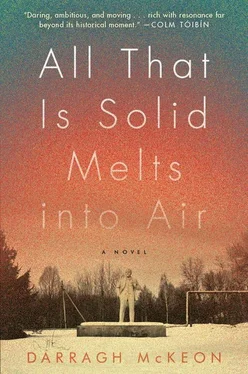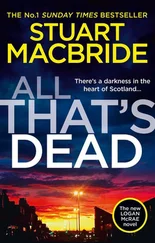Yakov Sidorenko won’t respect him if he just plays some kiddie tune. Yakov Sidorenko knows music. Yevgeni went last year with Maria to see him play a Liszt sonata in Tchaikovsky Hall. Sidorenko tiptoed through the notes, then he leaned back and played as if he were just hanging on, as if the music were a train that would come off its tracks at any moment, until, at the end, he crushed the keyboard, the music curled up into a corner, took its last breaths, and died all around them.
And they want him to play a kiddie tune in front of this man.
There are tables stacked on tables, great pyramids of them, and trolleys with wheels hanging in the air which turn merrily to a gust of wind. There’s grass coming up through the concrete, patches of it all around, and there’s a basketball hoop nailed to a wall through which many things are thrown but never a basketball; bottles and newspaper, cans and rocks, everyone at some point needing to test themselves against the challenge of the circle.
Yevgeni walks and looks and doesn’t stop and tries not to look like he’s looking.
A group of guys in fake leather jackets roast potatoes over a fire in an oil drum. There’s always an oil-drum fire going. Some of the older kids from school are there, the ones who don’t go to class but just walk in laps around the playground, or who smoke in the toilets. There’s one guy, Iakov, who plays in a rock band, so it is said, and he must be sixteen or seventeen, wise to so many things that Yevgeni can’t articulate or even imagine.
The barrel has burn holes in the side, which set free irregular bursts of sparks, but these never cause the guys to flinch. Even when a spark catches their jacket they just nonchalantly sweep it away with an open hand.
Iakov raises his head and spots Yevgeni, who has paused, staring at them, and Iakov slaps his friend on the arm and waves Yevgeni towards them, and Yevgeni puts his head down and keeps walking, even though they’ve probably seen him—of course they’ve seen him—but maybe there’s a chance that they’ll let it pass. Actually entering into the centre of things is not what he intended. He hears a whistle, shrill and piercing, which echoes around the buildings. There’s no way of ignoring it, a whistle means that you’ve been noticed, and don’t even think about running. He can whistle through the gap in his front teeth, a reedy sound, but this one is like the blast of a militia siren, two fingers wedged under the tongue. How they do it is beyond him. All those hours running arpeggios up and down the keyboard and still he can’t make the one sound that really matters. Get Mr. Leibniz to teach him this instead.
He looks up towards Iakov and looks behind him and points to himself— You’re calling me? —a dumb cover, and Yevgeni knows it and Iakov knows it, but he has to do something; he couldn’t just be open about the fact that he’d brazenly ignored him.
The only way to get through this is to show abject deference.
Iakov waves him over again, and they all turn to look, everyone giving a skulking look, a look that growls, and he runs towards them, his arms pumping, constricted by the straps of his schoolbag so that he can only really move his forearms up and down, which he knows makes him look ridiculous but better that than keep them waiting.
Iakov throws an arm around his shoulder and bends him forwards, rubbing his knuckles off Yevgeni’s head.
“This is the kid.”
“Which kid?”
He takes his arm from around Yevgeni’s head and stands him up, displaying him. Yevgeni’s face is by now the colour of the fire, a result of the run and the embarrassment and the jostling, all tinged with the element of dread.
“The gym kid.”
“Gym kid? What gym kid? He does cartwheels on top of moving buses?”
“Little fucking tomato muscles. Big fucking deal. He’s got superpowers or what?”
“Hey, kid, show us a handstand on this barrel.”
A quick wave of stunted laughter.
The guys are all older than Iakov. Even Yevgeni can see that Iakov is struggling in their company. They have bicycle spokes shoved into their potatoes, and they hold on to the end of the rod and slowly turn the potatoes over the flame, taking them off every now and again for inspection or to blow off any embers that look as if they have potential. Yevgeni can smell burnt oil and metal and rubber or whatever they are using for fuel, and a faint tint of crispy potato skin dancing over the stench.
“How many times do I need to tell you this story? Hanging on to the gym rope, his cock dangling in the wind, and Sukhanov down below with that crazy worm vein on the side of his head practically exploding he was so fucking mad.”
Illumination all round, rods going vertical so they can turn and get a look at him.
“Hey, you’re the kid.”
A few cuffs around the head, loose-wristed though, friendly.
“That Sukhanov used to make me sweat out the contents of my ball sack.”
“Sukhanov would make his own mother bleed.”
“Up there for three hours, I hear,” Iakov says.
Yevgeni knows he can’t have been up there for more than five minutes, but he lets the story develop its own pathways, lets them stretch it whatever way they want: it’s their story now, not his. He looks down and smiles. You don’t smile in front of them. Be respectful. Know your place. You’re only a hero so long as you don’t know it.
“Hey, kid, this one’s done. Take it.”
They flick him a potato, a short backhanded whip that makes it twirl through the air towards him. Yevgeni palms it and then bats it between hands, tapping and blowing, way too hot to hold.
Iakov gives Yevgeni a wink and a sideways nod: show’s over, time to go home.
Yevgeni walks off, still blowing the potato, scuffing his soles off the concrete, because he’s done good, kept his mouth shut, stuck one to the man.
“Fucking Sukhanov. Let him come round here, I’ll show him a fucking headstand.”
Pavel calls and invites her to a party, and Maria finds herself standing in an old bakery, with iron window frames divided into squares of frosted glass and the night outside coming through in a lustrous wash. Above her, on shelves and ledges, dozens of candles sit on cracked dishes, flames wavering, shadows running up the walls, sculpting the darkness of the high wooden roof.
She is one of the early ones and she curses herself for looking too eager, and she’s borrowed a dress from Alina—nothing striking, a plain black cotton dress with a dark felt shawl—but she looks as if she was born in another century from the people milling around the room, in their torn jeans and denim jackets, and the click of her heels pierces the conversations and she is nervous of slipping on the tiled floor. The feeling dissolves eventually as others arrive and, after some staggered conversation and a barrage of compliments, she relaxes. She is who she is, and not being dressed like everyone else is not exactly a situation she is unused to.
One of the old bread ovens still works, and they’ve turned it on and left the door open to heat the space, and everyone gathers on the other side of the room to avoid the blast of arid air, and they press close and talk easily, shedding layers of reserve, the conversation becoming less sporadic, words flowing easily, stories and darting wit and a studious consideration in many faces.
Everyone talks about the pilot. The whole city is talking about the pilot.
The facts are consistent. He’s nineteen. He’s a West German. He was wearing a red flight suit. This is what made the news. This one had to make the news—half the city saw him land. The West German government has already appealed for clemency.
Читать дальше












